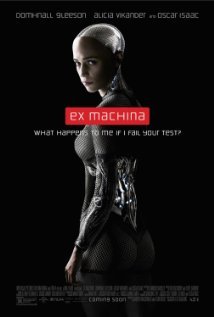Ex Machina
A Film Review by Lloyd I Sederer, MD
An innocent looking, 27-year-old computer programmer, Caleb (Domhnall Gleeson), discovers in his morning email that he has won the company competition to spend a week with its legendary founder and CEO, Nathan (played by the versatile Oscar Isaac), who at 13 developed code that led to the creation of Bluebook, which now controls 94 percent of global information searches.
Nothing that good can be what it is, right? Right.
Caleb boards a gleaming helicopter and is whisked above fjords, waterfalls and fecund fields (shot in Norway) and left for security purposes some distance from a vast, isolated, concrete compound; he walks there in a sports jacket and with a suitcase, further highlighting his status as novice and initiate. There he meets Nathan, who is socking a punching bag and lifting weights to recover from a night of heavy drinking. Why does this not seem auspicious? Yet Nathan, like a "bro," takes Caleb in and gets into his head by seducing his ambitions with a game-changing future for this young man, not to mention for civilization itself.
Nathan has gone beyond the child's play of his 13 year old's accomplishments. He has developed a machine that he contends has Artificial Intelligence (AI). He wants Caleb to perform the Turing Test in a series of meetings with the machine to determine if it has AI. The Turing Test, named for its creator Alan Turing in 1950 (he made all the more infamous by the film, The Imitation Game), determines if a machine has achieved the intelligence of a human.
The machine, it turns out, is a knock-out, in more ways than one. Forget Arnold, the machine in The Terminator, or the various block-buster upgrades that followed. This machine is named Ava (mesmerically played by Alicia Vikander), whom we first see as synthetic flesh and gleaming coils, as does Caleb. But there proves to be in her not only a mind with logos, ethos and pathos (the three forms of persuasion advanced by Aristotle) but one wired for titillation, enchantment and deception as well.
This is a dark movie. In one of the conversations between the humans (Nathan and Caleb), studded carefully between the sessions between Ava and Caleb (which take place across shatterproof plexiglass), Nathan envisions a future where mere humans are extinct and AI rules. I guess the machines are apt to win without a woman like Sarah Connor to best them; in Ex Machina the women unfortunately are on the other side of the battle from us humans. We did not need Nathan's prediction to sense where this film was going, but it is there just in case I suppose.
But the going there in this film is a mental chess game to behold and enjoy. We also get to watch not just the stunning Ava, but some of the other female prototypes (especially Kyoko, played with a mixture of robotic and sensual precision, by Sonoya Mizuno) who display not a trace of a coil or pulsating diode. No men with AI are to be seen, only the two backward human kind, despite Nathan and Caleb being prize mental specimens.
The film was written and directed by Alex Garland, his first as more than a successful script writer. He has a fine imagination, a feel for evil unceremoniously delivered, and the timing needed to produce suspense. Could he have AI? Probably not, since he is a man.
Next time you are at a busy intersection, waiting for a train or booting up at work, look around you. Is one of those you scan a pretty and super smart woman who could be an AI encased in the latest of soft polymer skin? If she winks at you, you better start looking for an exit.
The views expressed here are entirely my own. I take no support from any pharmaceutical, device, or robotics company.
Dr. Sederer's book for families who have a member with a mental illness is The Family Guide to Mental Health Care (Foreword by Glenn Close) -- is now available in paperback.
_______
Follow Lloyd I. Sederer, MD on Twitter: http://www.twitter.com/askdrlloyd

